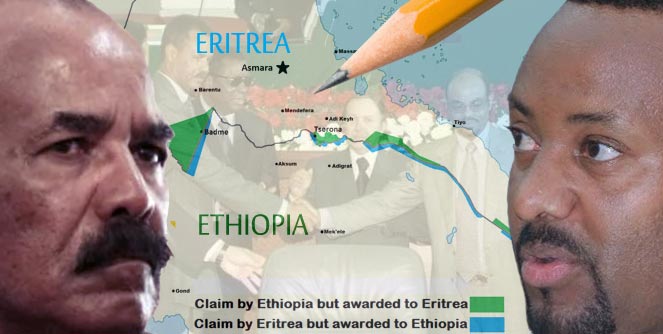Eritrea: Hazardous to Eritreans

Yes, it is almost entirely the Eritrean regime’s fault.
If you have no family in Eritrea, no connection to Eritrea, and all you had to rely for information about Eritrea was Google News–which aggregates Eritrean state media’s always happy news next to the almost always negative news about the country from independent media–you would have a very confusing image of Eritrea. It is the tragic death of Eritrean youth in forlorn places like the Sicilian coast that punctures reality and provides a jolt. This reality of Eritrean corpses, the televising of our young who die in horrific ways is often presented with a warning: “this image may be too graphic.” Similarly, a warning should be applied on the whole country: “Eritrea is hazardous to Eritreans.”
This week, as Eritrea’s Foreign Minister was telling the UN General Assembly that the UN must mend its ways–to become more just, more lawful–and that it must do so by restructuring itself from a uni-polar or bi-polar to a multi-polar world, many from the thousands of Eritreans who were escaping the unjust, the unlawful and the singular power of Eritrea’s tyrant were days away from taking their last breath in Lampedusa.
[youtube]http://youtu.be/mnaAjX068Qc[/youtube]
This week, as Eritrea’s state media was issuing its lament on the uni-polar and bi-polar state of the world, a dozen of Eritreans escaping Eritrea’s one-man rule were shipwrecked off the coast of Sicily (Ragusa) died far from home, in the company of kinder strangers.
[youtube]http://youtu.be/Hg4XDTgzUqo[/youtube]
If Eritrea is such a hopeful country where the government is making tangible progress to improve the lives of Eritreans, as its State media relentlessly says, why is it that those who would benefit the most from it, the youth, are leaving it by the thousands?
The facts speak for themselves. Eritrea’s youth, sentenced to an indentured servitude of compulsory and indefinite military service, are leaving Eritrea anyway they can. And, as they leave the warmth of their homes which have been changed into prison by the Eritrean regime, they are dying in Lampedusa, Calais, Almeria, Tijuana, Cartagena, El Latal, San Andres. the Moroccan Coast, the Mediterranean Sea and Sinai where, if they are not killed, they are beaten, raped, tortured and harvested for organs.
Comprehensive Failure
Those who are more interested in protecting the image of the Eritrean regime than they are of protecting their own compatriots have blamed everybody for the biblical-proportion tragedies that are raining on Eritrea’s youth. They have blamed the US and the UN for not enforcing the Eritrea-Ethiopia Boundary Commission (EEBC) ruling, thus, goes the argument, leaving Eritrea no choice but to maintain a large army in compulsory service. They have blamed the UN for sanctions it imposed on Eritrea in 2009. They have blamed the West for the “easy” asylum processes that act as a magnet to destitute youth. They have blamed the victims themselves for being materialistic and short-sighted. They have blamed their families for funding their escape. They have denied that the dead Eritreans are Eritreans. They have blamed everybody else except the Eritrean regime and its disastrous policies that have communicated one message to the youth: we are the predators and you are the prey.
Let’s consider each of the explanations given to exonerate the regime.
Even if the Eritrean regime truly believes that Ethiopia can attack Eritrea any time, is the military strategy it is using–soldiers enlisted against their will serving corrupt officers they despise–going to protect Eritrea from an Ethiopian assault? If the Eritrean youth are willing to endure unimaginable hardship to escape from Eritrea, what makes the regime think they would be willing to die for a cause they do not believe in–that of propping up a corrupt government structure? How did that work out for the Ethiopian Derg?
The sanctions that were imposed by the UN in 2009 (Resolution 1907) were not the outcome of a “unipolar” or “bipolar” world. Of the 15 security council votes, there was one negative vote (Libya’s Qaddaffi) and one abstention (China.) Even Russia voted for the sanctions which were imposed after the Eritrean regime rejected repeated pleas to stop its destructive role in Somalia and to acknowledge its dispute with Djibouti. These sanctions were re-enforced again in 2011 (Resolution 2023) again with 13 affirmative votes, without a “no” vote and with two abstentions (China and Russia.) Please note that the Eritrean regime could not get a “no” vote from Russia and China much less exercising their veto power because its destructive behavior was inexcusable even by their standards. So the Eritrean regime has nobody buts its destructive policies to blame for the sanctions and their consequences. In any event, since the sanctions were targeted– “arms embargo, as well as a travel ban and assets freeze on Eritrea’s political and military leaders”–how does that affect the Eritrean youth? Are they leaving because they don’t have new weaponry and are disheartened that Eritrea’s political and military leaders are prohibited from traveling and their assets are frozen?
And how “easy” is the asylum process in the West? Ask the millions of world citizens who are on cue waiting for their applications to be processed. The reason the asylum requests by Eritreans would get preferential treatment in some Western countries is because, for 12 long years, the Eritrean regime has lived up to every single justifiable cause for granting asylum: it has declared war on its own citizens and it is a predatory State. Eritrea, claim the asylum seekers, poses an imminent danger to Eritreans. And they are right, and the asylum-granters are rightly persuaded.
Lastly, the argument that the Eritrean youth are dying because they are too materialistic and want to get ipods and X-boxes is belied by the facts. (We will not, for now, focus on how tasteless and offensive it is to speak of the victims that disrespectfully, but those who support the Eritrean regime somehow slowly ease themselves into a life of losing their humanity.) First of all, it is not just the poor Eritreans who are leaving the country. It is even Eritreans who, by Eritrean standards, would be considered “rich”–and could afford Western gadgets– who are deserting the land of their ancestors. It includes Eritreans who have never heard of ipods and X-boxes. Secondly, is there something special about Eritreans that their affinity to video games and hamburgers far exceeds that of the rest of the Third World? If the argument is that the cause is economical, that the West is too strong a magnet for poor people, why does it pull Eritreans disproportionately? As we have written before, “Senegal and Guinea are closer to South America, than Eritrea is. Mali is closer to Spain and Malta than Eritrea is. Many African countries are, financially speaking, only marginally better off than Eritrea. In fact, many of the countries that Eritreans travel to on their way to their destination points are just as poor and their people are just as incentivized as Eritreans are to make more money—if money was the only issue. Still, Eritreans—on a per capita basis—leave their countries at rates far in excess that of most nations.”
There is also the argument that while these deaths are tragic, the Eritrean regime is not indifferent. So why is it that when Italy is declaring the death of immigrants including Eritreans off its coast as a national day of mourning, the Eritrean regime can’t even be bothered to mention them? Why is a regime that has an opinion on every subject under the sun–Iran’s right to nuclear weapons; Somalias need to unify into one state; how the UN calculates daily caloric intake requirements; the problem with Africa; the problem with the Arab world; the problem with the world–tongue tied when it comes to tragedies that befall its own citizens? If it is not indifferent, why do its ambassadors and consulates not make any effort to reach out to Eritrean tragedy survivors? It is because the regime has, with the head of state setting the tone that Eritreans are dispensable– they are “going on a picnic”, he said; “let them disperse, globalization is the great equalizer, I can always import professionals, he said– convinced Eritreans that it thinks they are dispensable.
Consider the countries of origin of those who accompany Eritreans. They are Somalis and Syrians and Ethiopians and Egyptians. Somalis and Syrians fit one profile: refugees leaving war-torn countries. Ethiopians and Egyptians fit another profile: overpopulated countries whose economic growth can barely keep up with their population growth. Then there is Eritrea: a small country of five million (so it is extrapolated: census is a state secret.) And until we have a government that obsesses over the well-being of every single Eritrean (after it actually counts them) in the manner that the current regime obsesses over every square inch of Eritrean land (an obsession it has failed to deliver on), Eritreans will continue to treat the country as a clear and present danger to their well-being and do what it takes to escape–even as they know the route they are taking is extremely dangerous. And if their asylum requests are denied and they are facing deportation, they will continue to have one destination: Anywhere but Eritrea. This does not tell us that they are naive or thrill-seekers; it tells us that the Eritrean regime has created a State that is hazardous to its own citizens.
We pray for the departed and give our condolences to the bereaved families. We hope the opposition, in all our disjointed existence, will be jolted out of its stupor and recognize that the only way to stop such tragedies from repeating over and over again is to target the root cause–the predatory Eritrean regime–in an organized and focused way. Today, we grieve– but justice requires we do more than that.
awate.com
inform. inspire. embolden. reconcile.
awateteam@awate.com


Awate Forum